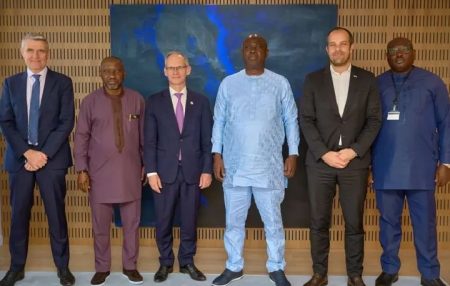 *Say N120bn required to revamp sector
*Say N120bn required to revamp sector
Oscarline Onwuemenyi
30 January 2012, Sweetcrude, ABUJA – Worried by the comatose state of the nation’s steel sector, the National Assembly on Monday charged the Ministry of Mines and Steel Development to do more to develop the nation’s steel industry and make it more
The Chairman, House Committee on Steel Development, Hon. Saddique Asema, who noted this during an oversight visit to the Ministry of Mines and Steel Development, also urged the Ministry to come up with relevant draft legal framework that would redefine the sector that could also be considered by the legislature.
He noted that no matter the transformation agenda pursued by the present administration, Nigerians and Nigeria’s economy may not benefit maximally except the Steel sector is fully developed, adding that a viable steel industry makes up for a large part of every development indices of any developed country.
He stated that, “At times I begin to worry why the Executive cannot and has continued to refuse to put in money to revamp the steel sector especially that of Ajaokuta, Delta Steel and Aladja. It is on record that no country can be said to have truly developed without a well-developed steel industry, and Nigeria has been playing with this sector for many years.
“All we need to bring back these critical industry is not more than N120 billion; it is my hope that this administration finds this money from other sources to bring back our steel industry before we can go ahead to privatize them if necessary.”
The legislator decried past administrations for not giving the needed attention to revamp the steel projects in Nigeria, stressing that, “I can assure you that apart from the government of Alhaji Shehu Shagari who put so much funds to develop the sector, other successive administrations have abandoned the projects and the industry at large.
According to Asema, with the steel sector fully developed, Nigeria would be a true giant of Africa.
He also noted that currently, there are no laws that guide or regulate the sector, hence the many failed attempts to privatise some of the steel companies in the country.
Asema said, “Presently, there are need for laws that will regulate the Steel industry in Nigeria, it is only painful that what we have now are mere agreements signed by the Ministry and those companies that benefitted from the purported privatization.
“We want your Ministry to come up with legal drafts especially as you already have experts as well as a legal unit, your officers should be able to come up with better drafts on the way forward for the sector after which you take the draft to the Federal executive Council for debate and finally the drafts comes to us at the national assembly to make inputs and come up with relevant laws, this is the best way i think all of us can go.”
He equally directed the Minister of Mines and Steel Development, Arch. Musa Mohammed Sada to press it on the Presidency to go back to the resolutions passed by the 6th National Assembly on Steel Development, stressing that if the resolution is revisited by the Executive, it will also go a long way to address the sharp practices in the sector.
Earlier, the Minister of Mines and Steel Development Arch. Musa Mohammed Sada told the committee that the ministry has already stated the drafting of such legal frame work to reposition the sector noting that the ministry still needs the Committee to approve its 2012 budget to enable it get sufficient funds to organize local and international fora in view of drawing inputs from international and local experts to contribute to such drafts before they are passed to the Federal executive council for considerations.
The Minister assured the committee that the present administration was determined to bring back the still projects so that the overall economy could be galvanized, adding that the rot that has taken place over many decades cannot be cleared overnight.
Sada promised that the ministry will work with the committee to craft the necessary regulations to guide the activities in the sector the benefit of the country.



